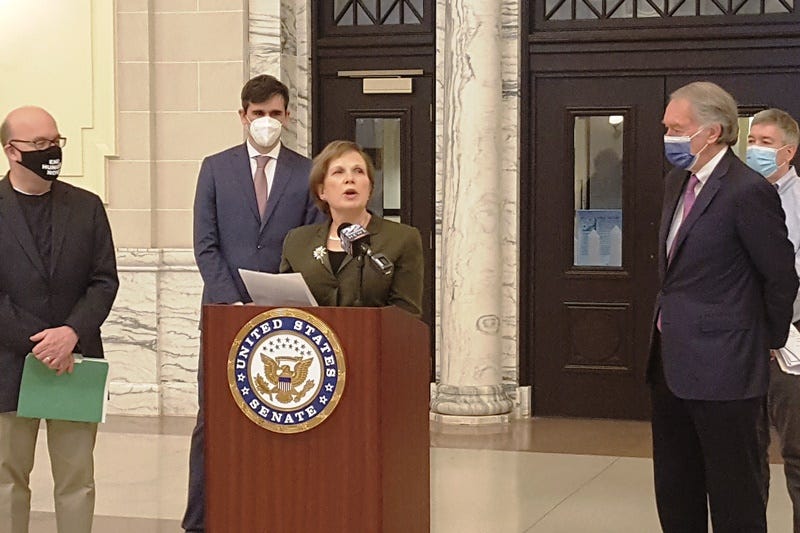Americans don't know how good it can be
Last week I took the stage with a US senator and US congressman to talk about what President Biden calls building back better.
It’s been quite a month. At Berkshire Publishing, I have to work out a system for publishing reference works and books when most customers want digital but a few still want print. But I’ve also been interviewed by the BBC about third places in the post-pandemic era, and last week I took the stage with a US senator and senior congressman to talk about trains, and then did my first TV interview by Zoom to talk about trains, of course, and about the rural-urban connection.
It was another US Congressman Seth Moulton who alerted me to something both obvious and hard to fathom: most Americans don’t know what it’s like to ride trains. He said, “People just don’t know how good it can be,” speaking from the US Capitol on January 13th and about to vote on then-President Trump’s second impeachment. I like to think that talking about trains was a good way to focus on the future during that dreadful time.
But it took me a while to grasp the truth of this.
Dalton Dwyer, a banker who’s working with me on the Train Campaign, says that it was living in London and traveling throughout Europe that made him realize how valuable train systems could be. I also lived in London for years and got used to taking the train, and I went to China and rode high-speed trains.
But this is not the experience of most Americans. Only 42% of Americans hold passports, and most of their trips out of the country are to Mexico and Canada. Some American cities have substantial public transit systems, but we have little regional rail and only a few long-distance lines left. In Britain, many rural rail lines were closed during the 1960s, but the national system remained intact. In the United States, we lost almost everything.
But not, fortunately, the Amtrak line that now-President Joe Biden took for most of his long political career between Delaware and Washington, DC.
The press conference was hosted by US Senator Ed Markey (who is known for his sponsorship of the New Green Deal) and Congressman Jim McGovern (who is chair of the Rules Committee and of the Congressional-Executive Commission on China) to present the BRAIN TRAIN Act, also sponsored by Senator Elizabeth Warren, which is aimed at funding intercity rail networks. This is one of the major new initiatives that will be developed in conjunction with the American Jobs Act, which is actually our long-awaited infrastructure bill. You can watch the press conference on YouTube. It’s 36 minutes - I’m on at 12 minutes in, and here’s the text of my remarks.
The next day I did a Boston WGBH-TV interview via Zoom, which meant trying to look at the camera and not at the faces of the people I was talking to - ugh.
Acting Locally: No Mow May
My neighbors are going to think I’ve made this up, but many towns are encouraging citizens not to mow their lawns in May to give bees and other pollinators a good start on the year. I drove to a rare-plants nursery in Connecticut last weekend and spotted lawn signs in several small towns that read, “No Mow May.” I hope this will soon come to Great Barrington so I don’t have to feel awkward when someone says, “I love your meadow.”
Pond watch
You may remember that my first COVID-19 project was building a small pond in my backyard. Here’s the video I posted last June.
A tropical water lily, sent to me in error, bloomed until October. Frogs colonized the pond and skated on the lily pads. Now I’m hovering over a female frog (right) whose sides are bulging. Her male companion (left) is also on watch, because apparently when the water is warm enough he will climb aboard and fertilize her eggs as she pushes them out (indeed, who knew?!). I was never interested in ant farms, but I love having this chance to watch wild things up close.
Happy May!









Hi Karen, Art Tafero from China (now in pleasant captivity in Florida). I have written extensively on the dismal, third-world rail system of the US and how it should cooperate with China in exchange for trade concessions while we still have tech points on the table to negotiate with. But, I don't see that happening; as political and union concerns trump sustainability concerns; something I know you are an expert in. Recently, I have been working with officials in Hong Kong and Beijing to reduce tensions among young professionals within the Singapore-Hong Kong bubble. There is a real chance that a sustainable economic solution could be found to satisfy all three major players: Beijing, Hong Kong, and the young professionals in Hong Kong and Singapore, but it will be very expensive for the CCP. However, it will be worth the money if a long-term solution is accomplished. Good luck with your publishing strategy. Regards, Art